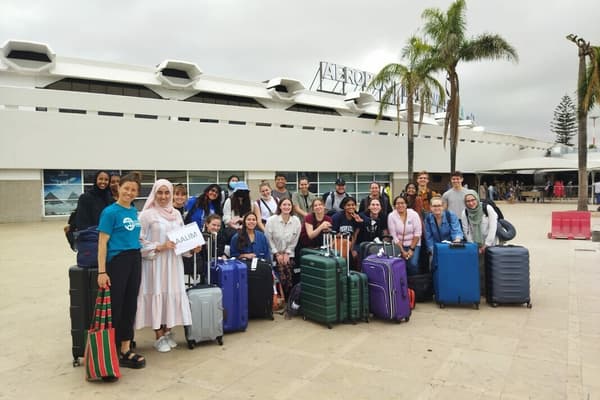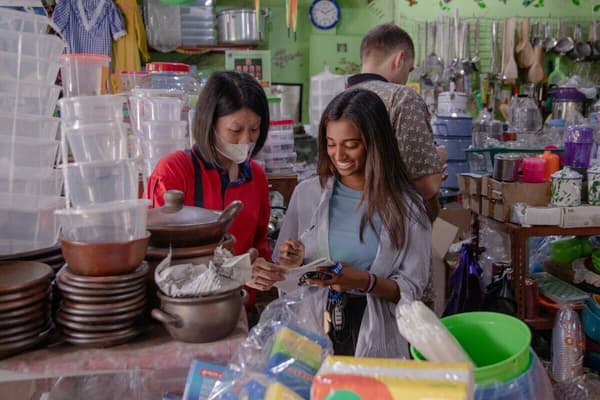Getting Ready
When preparing for the logistical considerations of living abroad, CLS finalists are encouraged to take advantage of the information available to them on their Canvas page, which includes videos, discussion forums, and additional resources intended to support finalists in preparing for travel. Reviewing the guidance provided in the site-specific handbook, as well as the information shared during pre-program orientation, can be particularly helpful to finalists in resolving logistical questions and concerns. Finalists are also encouraged to reach out to their CLS peers or to CLS alumni for travel tips and advice on what to bring to the host community.
Preparing to Travel
For some participants, CLS may be the first time that they have ever traveled abroad. For others, it may be the first time they are traveling without the guidance of family or loved ones. For finalists who have little to no experience with travelling independently, it is especially important to spend time learning about air travel procedures prior to departure, as CLS staff do not accompany participants on flights. CLS alumni can be a helpful resource for walking finalists through the process of flying internationally and helping them understand what to expect. Finalists are also encouraged to watch the 10 Things You Need to Know about Travel on CLS and First Time Travelers YouTube videos.
Typically, CLS participants travel from their home cities to a designated airport in the U.S., then take an international flight with their cohort to the host country or location. The same pattern is followed on the return journey. Travel to and from the host community can be lengthy, and it is common to have multiple layovers each way.
After finalists submit the CLS Travel Information Form via the AIS Forms portal, CLS staff make arrangements for their travel. In the spring, finalists are contacted via email and asked to review a draft of their travel itinerary. Finalists should read over their itinerary carefully, check that the departure and return airports and travel dates are accurate, and notify CLS staff if there are any corrections that need to be made. After the flight tickets are purchased, finalists receive a finalized copy of their itinerary via email.
While CLS staff arrange and purchase flight tickets, it is each participant’s responsibility to keep track of their flights by monitoring flight changes or delays. It is also each participant’s responsibility to notify each airline of any disability accommodations and/or special meals they may need while traveling. Finalists are responsible for arranging and paying for transportation for themselves between their homes and the airport upon departure from and return to the U.S. and may use funds from their CLS participant stipend to offset the cost of this transportation. Finalists should ensure that they do not forget to bring their passport with them to the airport.

CLS students arrive in Morocco.
Packing
Each finalist’s travel itinerary lists the number of checked bags that are included in each ticket. In most cases, the CLS-purchased international group flights allow for one checked bag per passenger without incurring additional fees. However, CLS-purchased tickets most likely require participants to pay to check a bag on domestic U.S. airlines and domestic airlines in the host country. The CLS stipend is calculated to cover the cost of one checked bag for instances in which airlines charge a fee for the first checked bag. Each participant is responsible for researching checked bag fees and weight and size limitations for luggage ahead of time, as these vary by airline. To facilitate ease of travel and to avoid fees beyond that which is covered by the stipend, CLS staff recommend that participants travel with only one checked bag.
When planning what to pack, finalists are encouraged to review the site-specific handbook provided by CLS staff, which contains guidance on what types of clothing are culturally appropriate to wear in the host community. A suggested packing list for finalists is available here. Finalists should research the weather of their host city and consider contacting CLS Program alumni to ask for further advice on clothing and packing. Participants should also bring any materials shipped to them by CLS staff prior to the start of the program, including an emergency wallet card, allergy card (if applicable), their ASPE documents, and their CLS t-shirt.
Lost and Delayed Luggage
Air travel carries an inherent risk of lost and delayed luggage. In the event that a participant’s checked luggage is lost or delayed during travel to the CLS host community or on the return trip, the participant must report the issue to the baggage service counter of their final airline immediately upon arrival in the final destination airport. The participant will need to file a report at the airport in order to pursue a claim. The participant must work with airline representatives to find their luggage and have it delivered.
Finalists can prepare for the possibility of lost or delayed luggage by packing their carry-on carefully. Finalists should pack the following items in their carry-on:
- Identity documents (passport, printed copies of identity page and visa page of passport, personal ID card, personal medical insurance card)
- Travel documents (CLS travel itinerary, printed boarding passes)
- Money, debit cards, credit cards, etc.
- All medications and medication-related documentation
- Emergency wallet card, ASPE documents, and allergy card(s) (if applicable)
- Electronics and charging cables
- Basic toiletries
- At least one change of clothes and a set of pajamas
- Home/car keys
CLS staff do not recommend bringing anything irreplaceable or of high value on the CLS Program. If a finalist chooses to do so, they should pack such items in their carry-on instead of in checked luggage in case the luggage is permanently lost.
Electronics
Voltage in CLS host cities may differ from that in the United States, and many countries use differently shaped electrical sockets, for which participants need plug adapters. Finalists are advised to do some research prior to departure to determine which electronic devices and appliances can be used safely in their host country or location. It is highly recommended that finalists purchase adapters, converters, or transformers in the U.S. so that they can use them immediately upon arrival in the CLS host city.
Generally, devices such as laptops and smartphones are designed to work at different voltages and can safely be used with a plug adapter, but finalists should check the specifications for their devices. Personal appliances, such as hairdryers, electric shavers, or electronic toothbrushes, are typically designed to work at only one voltage and may require a voltage converter in addition to the plug adapter to avoid damaging or destroying the appliance. Converters or transformers that can convert voltage are available for purchase online or at some retail stores. Participants may also consider purchasing personal appliances in the host city after they’ve arrived or adopting a low-tech alternative during the program.
Gifts
Finalists may want to bring small gifts for those they’ll interact with abroad, such as their host family/roommate, Language Partner(s), host institute staff, and/or teachers. Gift giving norms vary from culture to culture, but it is more the thought that counts, so meaningful gifts are better than expensive items. Finalists might consider purchasing items from the list below, which is based on advice from CLS alumni:
- Postcards or calendars with photos of a participant’s hometown or campus
- Gifts for children such as books, pencils, notebooks, crayons, or matchbox cars
- T-shirts, baseball caps, or sweatshirts, especially those with pictures or insignia
- Packaged food products from your home region, such as Vermont maple syrup, Louisiana Cajun seasoning, Maryland Old Bay seasoning, ingredients for a key lime pie, etc. (Finalists should be sensitive to cultural culinary norms; for example, Muslims do not eat pork products.)
Keychains, magnets, or trinkets featuring monuments or landmarks from a finalist’s home region are a good last-minute gift idea that can be purchased at the airport. It is also possible to purchase small gifts, such as candy or flowers, in the host community.

A participant enjoys a picnic with his host family in Kyrgyzstan.
Communication
Staying in touch with friends and family back home is often a key source of encouragement for participants throughout the program. Finalists should keep in mind that the availability of options for communication in their CLS host city will likely differ from options in the U.S. As a result, it is helpful for finalists to plan ahead and determine what communication methods will work best for them during the summer.
Cell Phones
Finalists who plan to take their personal cell phone on program are encouraged to research the steps they will need to take in order to use their phone abroad. In many cases, finalists are not able to use a SIM card in the host community with their cell phone unless the phone had been “unlocked” by their provider prior to departing the U.S. Finalists are encouraged to contact their provider to confirm that they will be able to insert a foreign SIM card into their phone and use a local phone plan while abroad.
During in-country orientation, staff provide site-specific information about using cell phones abroad, including how and where participants can purchase a SIM card and/or sign up for a phone plan. The CLS participant stipend includes some funds to cover basic telephone connectivity to contact local staff in case of emergency, but it is not intended to fund data usage or international calls while a participant is abroad. Please note that if a participant’s cell phone breaks or is damaged or lost during the program, the CLS Program will not cover the cost of replacing it.
If a participant does not have a cell phone that works in their host community, they will be provided with a cell phone for use soon after arrival in the host community. These cell phones are typically modest and pre-paid. In most cases, there is no phone plan; rather, participants must purchase credit to make calls and send text messages. CLS provides some funds via the participant stipend to cover basic phone credit, but participants are responsible for managing their use and covering the cost of additional credit. Participants are responsible for keeping their phone with them at all times during the program and ensuring that the phone has sufficient pre-paid minutes for emergency use.
Some participants may be interested in purchasing an international plan with their existing phone company. Participants should be advised that this is typically significantly more expensive than securing cell phone service locally. Additionally, in most cases this means program staff must set up an additional local number for the participant, as most U.S.-based phone plans offer only a U.S.-based number, and local staff incur exorbitant charges when calling a U.S.-based number.
Kakao, LINE, WhatsApp, FaceTime, or VOIP Services
Due to the expense of making calls, many participants opt to use apps to communicate with family and friends back home, as well as with people in the host community. Options include social media, communication apps like Kakao, LINE, and WhatsApp, Voice Over Internet Protocol (VOIP) services, and video chatting/FaceTime. It’s important to note that access to certain platforms, or even to the Internet in general, may be restricted in some CLS host countries and locations. Before going abroad, it’s helpful to research what platforms will be available and are used most frequently by people in the host community. For more information on using social media while on program, please see the “Internet and Media Guidelines” section of the CLS Terms and Conditions.
Wi-Fi Access
CLS participant housing may or may not include access to Wi-Fi. If housing does provide access to Wi-Fi, it may be weaker and slower than participants are used to, and connectivity may drop frequently and without warning. It is not a requirement for CLS housing to provide Wi-Fi access.
Depending on the program site, there may be locations around the host city where participants can access free Wi-Fi, such as fast-food restaurants or coffee shops. There may also be Internet cafes where participants can access computers and the Internet for a fee. Participants may ask their Resident Director, institute staff, host family/roommate, and/or Language Partner(s) for suggestions on accessing Wi-Fi in the host city.

A student interviews a merchant in Malang, Indonesia.
Financial Considerations
Most expenses related to participating in CLS, such as tuition, required cultural excursions, and housing expenses, are directly covered by the CLS Program. However, it is prudent for each finalist to consider their personal financial situation and spending habits and develop an approximate budget for the summer before going abroad. If a finalist is curious about the cost of common items in their host country/location (such as tickets on public transportation, a cup of coffee, or the cost of going to a movie), CLS Program alumni can provide insight based on their recent experiences abroad. Please note that prices for goods and services in many countries may increase unexpectedly due to inflation.
In addition to budgeting for expenses abroad, finalists should also identify expenses that they are likely to incur at home while participating in the program, such as rent, student loan payments, insurance premiums, and internet or phone service, and make a plan to submit payment for these expenses while they are abroad. Please note that the participant stipend provided by CLS is not intended to cover U.S.-based expenses while a participant is on program.
Participant Stipend
To help offset the cost of personal expenses incurred at the program site, finalists receive a one-time stipend in the form of a direct deposit to their bank account, which typically arrives in May or June. The purpose of the stipend is to cover the cost of necessary items not directly provided by the program, such as local transportation, meals not provided by the host family or accommodations, incidentals (shampoo, soap, etc.), and school supplies. It is intended to facilitate participants’ reasonable engagement with the host community, for example, by allowing participants to buy tickets to a museum or movie theater. Stipend calculations are based on the cost of moderately priced items in the host country or location.
The CLS participant stipend does not cover the following: the cost of requesting an official transcript to submit to the CLS Program as part of the acceptance process; the cost of appointments with medical professionals necessary to complete the CLS medical review process; the costs of receiving medical or dental care or prescription medications abroad (that are not eligible for reimbursement through ASPE); fees for oversized luggage or more than one checked bag on international flights; international bank or credit card fees; international calls or texts, or an international phone plan; costs associated with engaging in hobbies in the host community (such as gym memberships); meals at expensive restaurants; alcohol; souvenirs; or costs that a participant’s home institution may require to transfer CLS academic credit to the institution. It is also important to note that that the CLS stipend does not include funds to offset the cost of participant-initiated independent travel. If a participant plans to travel within their host country, it is important for them to consider their personal budget and the CLS schedule, as most activities are mandatory and the program schedule is demanding.
If a finalist withdraws from the CLS Program prior to the start of their institute, they must return the stipend to American Councils for International Education. If a participant withdraws during the CLS Program, they must return a prorated amount communicated to them by CLS staff.
ATM/Currency Exchange
Most participants choose to access their stipend funds via ATM withdrawal using a debit card while abroad, as many CLS host communities use cash as the basis of typical daily transactions. Other participants may opt to bring U.S. dollars to exchange for local currency in the host city. ATMs in the host community may offer decent currency exchange rates, but it is important to note that U.S. banks typically charge a fee for ATM withdrawals abroad. Different banks have different policies for withdrawal fees, ranging from a flat fee to a percentage of the withdrawal. For debit cards with a flat fee for overseas withdrawals, withdrawing larger sums of local currency a few times throughout the summer makes sense; for those with a percentage-based fee, it may make more sense to bring cash from the U.S. to exchange in the host community. Finalists should familiarize themselves with their bank’s fee policies, as well as the availability of ATMs and currency exchange services in the host community. Finalists should also make sure to inform their bank about the dates and location(s) of their travel before departure, as some banks may auto-decline transactions made outside of the U.S. The CLS Program does recommend that participants bring some cash with them in case their debit card does not work upon arrival in the host city.
Debit/Credit Cards
Some CLS host cities may have shops or vendors that allow customers to pay for purchases directly using a debit or credit card, although this tends to be less common than it is in the United States. However, finalists should consider bringing a credit card if they have one, as they can be a good backup option in the event of a significant, unexpected expense while abroad, such as a medical bill. Similar to ATM withdrawals, most credit and debit cards often incur foreign transaction fees for purchases made overseas. Finalists should understand their cards’ policies on foreign transaction fees and inform their credit card provider where they are traveling to before departure.
Some CLS host cities may have shops or vendors that allow customers to pay for purchases directly using a debit or credit card, although this tends to be less common than it is in the United States. However, finalists should consider bringing a credit card if they have one, as they can be a good backup option in the event of a significant, unexpected expense while abroad, such as a medical bill. Similar to ATM withdrawals, most credit and debit cards often incur foreign transaction fees for purchases made overseas. Finalists should understand their cards’ policies on foreign transaction fees and inform their credit card provider where they are traveling to before departure.
Tips for Bringing Money
- Participants should bring the majority of their money in a cash-accessible form (i.e. debit card).
- Participants should bring some cash in case their debit card does not work upon arrival in the host city or malfunctions during the summer. Many participants report that their card did not work at some point during the program. If a participant’s card does not work, they should leave that ATM and try another; the problem is often with the machine rather than the card.
- Finalists should contact their bank and credit card company (if applicable) before leaving to notify them of the dates and location of their travel; otherwise, the bank may deny withdrawals or transactions made while abroad and/or lock the cards due to suspicious activity.
- Participants should bring new, clean, and crisp dollar bills. Banks and exchange offices rarely accept bills that are old, torn, or have any markings on them.
- Participants should not bring travelers’ checks. It is difficult to find places to cash them and there can be a large fee.
- Participants should remember to take their passport with them when exchanging money at a currency exchange or bank abroad.


